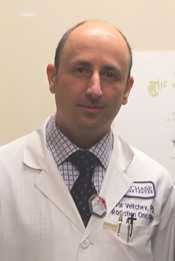Program Information
First Experimental Verification of the Accuracy of Absolute Dose Reconstruction From PET-CT Imaging of Yttrium 90 Microspheres
I Veltchev*, E Fourkal , M Doss , C Ma , J Meyer , M Yu , E Horwitz , Fox Chase Cancer Center, Philadelphia, PA
Presentations
SU-E-T-189 Sunday 3:00PM - 6:00PM Room: Exhibit HallPurpose: In the past few years there have been numerous proposals for 3D dose reconstruction from the PET-CT imaging of patients undergoing radioembolization treatment of the liver with yttrium-90 microspheres. One of the most promising techniques uses convolution of the measured PET activity distribution with a pre-calculated Monte Carlo dose deposition kernel. The goal of the present study is to experimentally verify the accuracy of this method and to analyze the significance of various error sources.
Methods: Optically stimulated luminescence detectors (OSLD) were used (NanoDot, Landauer) in this experiment. Two detectors were mounted on the central axis of a cylinder filled with water solution of yttrium-90 chloride. The total initial activity was 90mCi. The cylinder was inserted in a larger water phantom and scanned on a Siemens Biograph 16 Truepoint PET-CT scanner. Scans were performed daily over a period of 20 days to build a calibration curve for the measured absolute activity spanning 7 yttrium-90 half-lives. The OSLDs were mounted in the phantom for a predetermined period of time in order to record 2Gy dose. The measured dose was then compared to the dose reconstructed from the activity density at the location of each dosimeter.
Results: Thorough error analysis of the dose reconstruction algorithm takes into account the uncertainties in the absolute PET activity, branching ratios, and nonlinearity of the calibration curve. The measured dose for 105-minute exposure on day 10 of the experiment was 219(11)cGy, while the reconstructed dose at the location of the detector was 215(47)cGy.
Conclusion: We present the first experimental verification of the accuracy of the convolution algorithm for absolute dose reconstruction of yttrium-90 microspheres. The excellent agreement between the measured and calculated point doses will encourage the broad clinical adoption of the convolution-based dose reconstruction algorithm, making future quantitative dose/outcome studies possible.
Contact Email:


